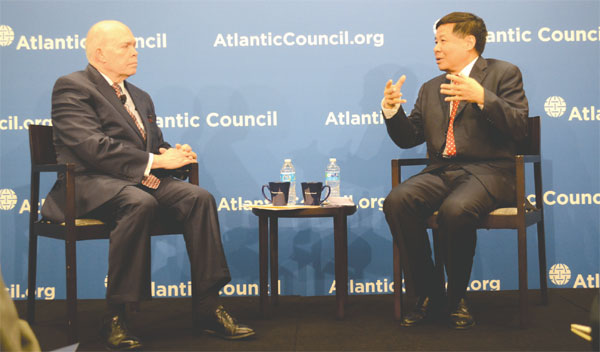AIIB 'complements' banks
The Asian Infrastructure Investment Bank (AIIB) is to complement the World Bank Group and the Asian Development Bank (ADB), not to replace them, China's Vice-Finance Minister Zhu Guangyao said on April 17.
"The relationship between AIIB with the World Bank Group and the ADB is complementary, rather than replacing," Zhu said at the Atlantic Council, a Washington-based think tank.
Zhu was invited by Jon M. Huntsman Jr, chairman of the Atlantic Council, to give remarks on the sidelines of the World Bank/IMF Spring Meetings 2015.
Zhu restated that the foundation of the AIIB was "based on the real demand of the infrastructural development in China", hoping to fill the $8 trillion gap between supply and real demand of infrastructure investment in the next 10 years.
Chinese President Xi Jinping has made three-point instructions guiding the establishment of AIIB in Beijing: showing solidarity toward challenges to promote growth, infrastructural development to boost economy, and the openness and inclusiveness of AIIB, according to Zhu.
Zhu dismissed the view that the AIIB is intended to replace existing lenders dominated by the US and Japan, saying that China's is the "constructive role and the contributor". China's purpose is to enhance the capacity of contribution to the world, rather than any intention to "overthrow the current system".
"We really hope the World Bank Group and ADB play more important roles, increase the lending leverage and give more support to Asia," Zhu said.
Zhu stressed that the real goal of AIIB is infrastructure development, which cannot be changed any time. It will insist on the guiding policy, he said.
Zhu said that the founding nations of AIIB would meet soon to discuss the bank's mandate and reach a consensus on the responsibilities of each nation, hoping these could be concluded within two to three months this year.
"China also wants high standards for the bank," he said.
Zhu also expected that China and the US could exchange negative lists on the Bilateral Investment Treaty (BIT) "this month or next month", make substantial progress in September when President Xi would meet with US President Obama, and finish the treaty talks before the end of the Obama administration.
"We will try very hard to conclude negotiations of the investment treaty next year based on reality and the hard work of both negotiation teams," Zhu added.
Regarding the refusal to reforms of the International Monetary Fund (IMF), Zhu urged the US Congress to approve the 2010 IMF quota reform agenda.
"That's been five years, too long a time, too much delayed," he said. "That damages the reputation of IMF, damages G20, and also damages the image of the US."
Liu Xiaoxian in Washington contributed to this story.
|
Zhu Guangyao (right), China's vice-finance minister, discusses China's vision for a more prosperous Asia-Pacific region with Olin L. Wethington, senior fellow at the Brent Scowcroft Center on International Security, at the Atlantic Council on April 17 in Washington. Liu Xiaoxian / for China Daily |



















